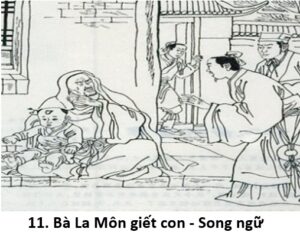Bà La Môn giết con – The Brahman Kills His Son – Song ngữ
English: Tetcheng Liao.
Việt ngữ: Hòa Thượng Thích Tâm Châu.
Compile: Middle Way Group.

The Brahman Kills His Son – Bà La Môn giết con
Once upon a time, there was a Brahman who prided himself on his erudite knowledge of astrology and various arts. He was such a conceited man that he claimed to be learned in everything.
Xưa có người Bà-la-môn (6) đối với kỹ-nghệ, nghệ-thuật xem tinh-tượng… cậy mình là thông-suốt hết thảy.
To show his ability, he went abroad carrying his son in his arms and cried. The Brahman was asked, “Why are you crying?”- He replied, “This baby is going to die within seven days. I’m grieved at his inevitable death. That’s why I can’t help crying.”- The contemporaries said, “It’s difficult to know a man’s life. It’s easy to make a miscalculation. He may not die seven days. Why should you weep in advance?”- The Brahman said, “The sun and the moon may set and the stars may fall, but I have never had a miscalculation on my record.”
Muốn tỏ đức mình, người ấy đi sang nước khác, ôm con khóc. Có người hỏi: “Tại sao ông khóc?” – Người ấy đáp: “Bảy ngày nữa đứa nhỏ này sẽ chết. Tôi thương nó chết non nên tôi khóc!” – Những người ở đấy nói: “Mệnh người khó biết, tính-toán hay lầm, nhỡ bảy ngày nó không chết thì sao, vạ gì ông phải khóc trước vậy?” Người ấy đáp: “Mặt trời, mặt trăng có thể tối, tinh-tú có thể sa nhưng, sự ghi nhận của tôi quyết không sai được!”
To prove his self-claimed knowledge, he killed his son on the seventh day, for the sake of fame and gain. The contemporaries heard the news of his son’s death at the foretold time. They marveled that he was indeed an erudite man who could prove true of what he had said. They all came to pay him homage, and were heartily convinced that he deserved respect (as a prophet).
Vì danh-lợi, hết bảy ngày người ấy tự giết con mình để chứng-nghiệm cho lời nói của mình. Và, sau đó những người địa-phương nghe biết con người ấy đã chết, ai cũng khen ngợi: “Thực bậc trí-giả, nói đúng không sai!” Từ đó họ sinh tâm tín-phục và quy-kính.
This is also true with those of Sakyamuni’s four degrees of disciples who claim to have attained the path of Enlightenment for the sake of the material offerings from others. They would try to fool people by killing an innocent man in order to deceitfully show the virtue of compassion. Such disciples would be certainly doomed to limitless suffering in time to come, just like the Brahman who wanted to prove the accuracy of his prophecy by killing his son and thus deceived people.
Các đệ-tử Phật vì lợi-dưỡng tự cho mình là đắc đạo, đem những pháp làm ngu-mê nhân-loại, giết chết hạt giống lành của chúng-sinh, trá hiện đức từ-bi…, để mai sau này phải chịu khổ vô cùng. Như người Bà-la-môn muốn chứng-nghiệm lời nói của mình, giết con để mê-hoặc người đời, không khác.
Source:
Tài liệu tham khảo:
- http://www.buddhism.org/Sutras/2/FablesSutra.htm
- https://tienvnguyen.net/a615/kinh-bach-du-sakyamuni-s-one-hundred-fables
- https://phatphapungdung.com/phap-bao/kinh-bach-du-thich-tam-chau-dich-113682.html
- https://daitangkinh.net/?f=Kinh-Bach-Du/1#c2
- http://diendan.thapchilientam.vn/index.php?threads/kinh-bach-du-100-cau-chuyen-ngu-ngon-cua-duc-phat.1707/
